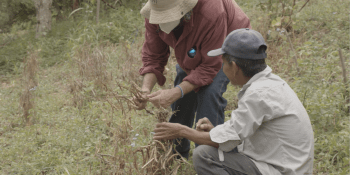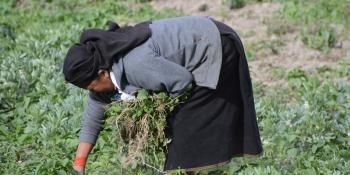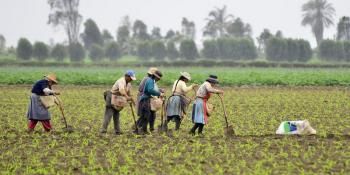Young scientists win grants to research low emissions agriculture
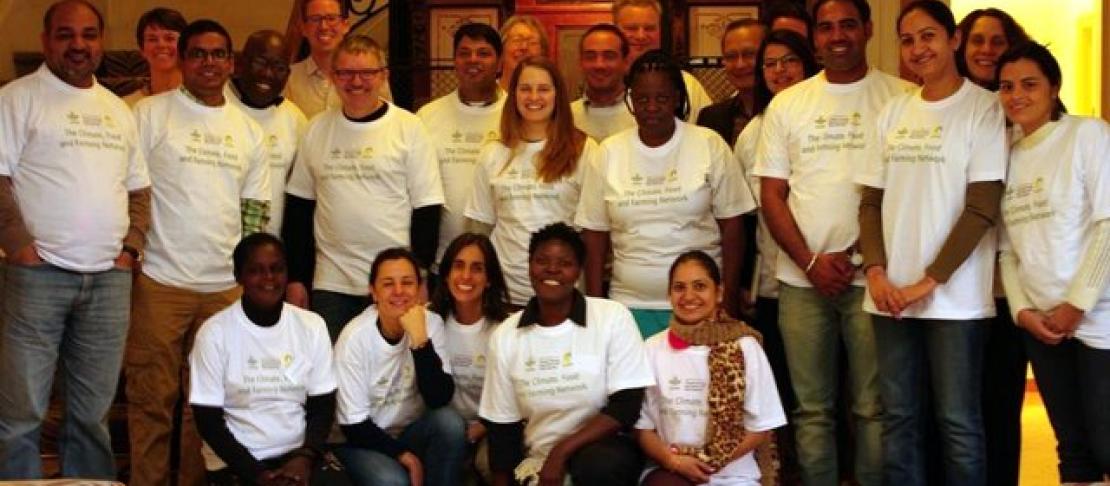
Investing in the capacity of young climate scientists is crucial for improving climate change mitigation in developing countries. With a new research grant, the Climate, Food and Farming Network seeks to boost mitigation research and practice alike.
The Climate, Food and Farming (CLIFF) Network announced research grants for eight new students in January. In March, the grant recipients met with experts in their areas of study, refined their research plans, and shared experiences from the field research and PhD studies at an inception workshop. In addition, the winners attended the Global Science Conference on Climate Smart Agriculture in Montpellier, France.
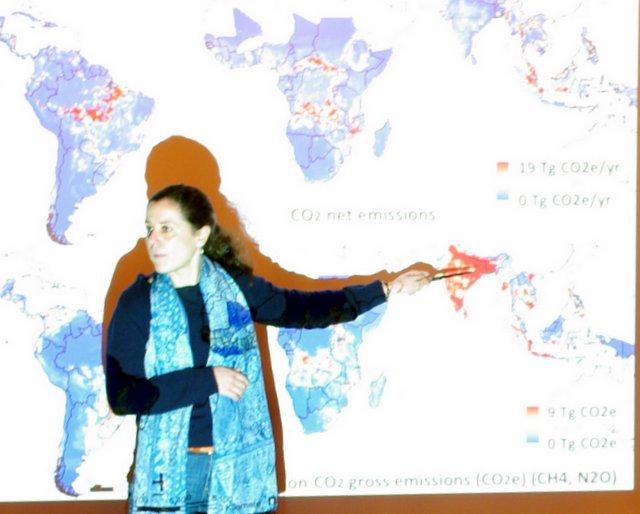
Rosa Maria Roman Cuesta of Wageningen University reports on global hot spots of greenhouse gas emissions. Photo: T Kandel Aarhus
At the workshop, the students also learned about the Standard Assessment of Mitigation Potential and Livelihoods in Smallholder Systems (SAMPLES) programme and strategic research initiatives. Moreover, they received technical input from SAMPLES scientists. Professor Jørgen E. Olesen from Aarhus University, Denmark presented principles and methodological approaches of climate change mitigation in developing countries.
Low emissions agriculture research
Scientists of the SAMPLES programme presented the projects in which CLIFF students will be taking part during their 3-4-months research period. Among the issues covered are:
- Combining mitigation potential from the livestock sector with LED pathways, International Livestock Research Institute (ILRI), Kenya
- Supporting low emissions development planning in the Latin American cattle sector, the International Center for Tropical Agriculture (CIAT), Colombia
- Quantification of greenhouse gas emissions from wheat and maize based system, International Maize and Wheat Improvement Center (CIMMYT), India
- Mitigation strategies in rice production, International Rice Research Institute (IRRI), the Philippines and Vietnam
Spotlight on gender in low-emissions rice cultivation in Southeast Asia
Geeta Bhatrai Bastakoti, a grant recipient, is a Nepali citizen currently pursuing a PhD in Gender and Development Studies at the Asian Institute (AIT) in Thailand with a focus on gender implications of food security and climatic variability in Nepal. For her CLIFF research, she will work with a gender project in the Philippines and Vietnam. Specifically, the project addresses how gendered patterns of interactions and the degree of women's integration in decision-making influence collective action to adopt a rice management practice called alternate-wetting-and-drying (AWD). AWD significantly reduces methane emissions from paddy rice cultivation. B. Ole Sander of IRRI is directing Geeta's research.
“There is strong connection between my current PhD study and gender element in AWD project," Geeta said during the workshop. "I am particularly interested in comparing adoption processes of climate-smart agricultural practices in Nepal, my PhD study site, with the Philippines and Vietnam, which are the study sites of the CLIFF project,” she continued.
Spotlight on rice-wheat systems in South Asia
Pardeep Sagwal, a CLIFF grantee from India, is analyzing effects of tillage, cultivars, nitrogen and residue management on crop performance and carbon sequestration in rice-wheat cropping systems. A PhD student of Agronomy at Haryana Agricultural University in India, Pardeep will work with researchers ML Jat and Tek Sapkota at CIMMYT in India.
“Understanding temporal dynamics of fluxes in plant-soil-atmosphere continuum is essential for climate-smart management in smallholder agricultural systems," Pardeep explained in his presentation at the workshop. "Although the wheat-and-rice-based cropping system is common among smallholder farmers in South Asia, information about atmospheric impact of crop management in such system is still lacking. My research will contribute to fill this gap,” he predicted.
Science and development move forward hand in hand
Grant recipients appreciate the inputs provided for their PhD research and described the workshop as a big experience to meet scientific community in climate change. Presenters focused on the need for students to take initiative and push the work forward. Alice Onyango, a grant recipient who will be working with Klaus Butterbach-Bahl of ILRI and Mariana Rufino of the Center for International Forestry Research (CIFOR), left the workshop motivated to expand her work in Kenya.
“It was a huge opportunity and great exposure," Alice said after the workshop. "The best part for me was hearing renowned scientists from across the globe whose work I cite frequently. The poster session at the Climate Smart Agriculture conference was a great eye-opener. Attending the workshop and conference was not just learning new things. It also contributed to work towards publication of my research,” Onyango concluded.

Tanka Kandel, left, of Aarhus University, with 2015 CLIFF grant recipients in Montpellier.
More about CLIFF
CLIFF was launched in 2011 as a collaborative initiative between the CGIAR Research Program on Climate Change, Agriculture and Food Security (CCAFS), and two Danish Universities: the University of Copenhagen and Aarhus University. Over the past 4 years, a total of 35 postgraduate students (18 female and 17 male) from developing countries received grant to support their study. The students have published 15 papers in peer-reviewed publications. The list of recipients’ articles can be found on the CLIFF webpage. Please contact Julianna White for more information.
Tanka Kandel is a post-doctoral researcher at Aarhus University in Denmark. The CLIFF Network is a collaboration of Aarhus University and CCAFS Low Emissions Agriculture.

